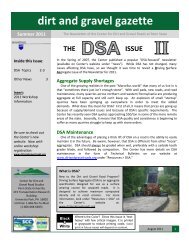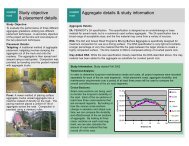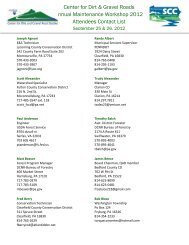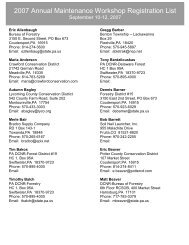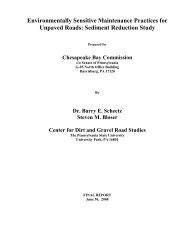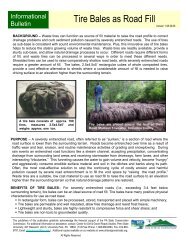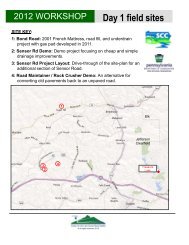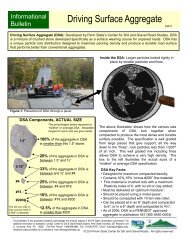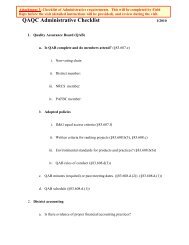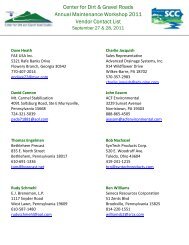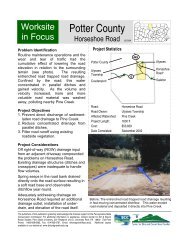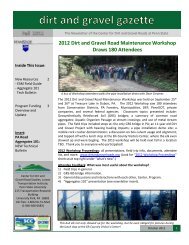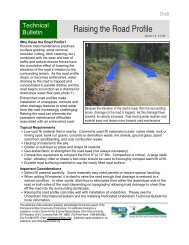Administrative Guidance Manual - Center for Dirt and Gravel Road ...
Administrative Guidance Manual - Center for Dirt and Gravel Road ...
Administrative Guidance Manual - Center for Dirt and Gravel Road ...
Create successful ePaper yourself
Turn your PDF publications into a flip-book with our unique Google optimized e-Paper software.
F. Penn-DOT<br />
The Pennsylvania Department of Transportation may require permits <strong>for</strong> certain<br />
situations encountered while utilizing the <strong>Dirt</strong> <strong>and</strong> <strong>Gravel</strong> <strong>Road</strong> Maintenance Program.<br />
In some instances a Highway Occupancy Permit may be required or mobilization of<br />
equipment or heavy hauling on Penn DOT roads may require a permit. Check with the<br />
Penn-DOT Regional Offices with any questions pertinent to Penn DOT permits.<br />
G. Pennsylvania Historical <strong>and</strong> Museum Commission (PHMC)<br />
Significant modification to a road, right-of-way or other areas outside of existing<br />
infrastructure may encounter historical artifacts. The Pennsylvania Historical <strong>and</strong> Museum<br />
Commission’s Bureau <strong>for</strong> Historic Preservation reviews <strong>and</strong> comments on undertakings of<br />
state <strong>and</strong> federal agencies, as required by the Pennsylvania History Code (Act 70, 37 Pa.<br />
Cons. Stat.) <strong>and</strong> Section 106 of the National Historic Preservation Act. Contact with the<br />
Pennsylvania Historic <strong>and</strong> Museum Commission should be made if there is any question<br />
regarding a site’s historic, archeological or paleontological status. For further<br />
in<strong>for</strong>mation contact the Pennsylvania Historic <strong>and</strong> Museum Commission.<br />
H. Pennsylvania One Call System<br />
Pennsylvania One Call System, Inc.<br />
Call Be<strong>for</strong>e You Dig!<br />
1-800-242-1776<br />
The Underground Utility Line Protection Act, Act 287 of 1974 as amended by PA Act<br />
187 of 1996, amending the act of December 10, 1974 (P.L. 852, No. 287), entitled "An<br />
act to protect the public health <strong>and</strong> safety by preventing excavation or demolition work<br />
from damaging underground lines used in providing electricity, communications, gas, oil<br />
delivery, oil product delivery, sewage, water or other service; imposing duties upon the<br />
providers of such services, recorders of deeds, <strong>and</strong> person <strong>and</strong> other entities preparing<br />
drawings or per<strong>for</strong>ming excavation or demolition work; <strong>and</strong> prescribing penalties,"<br />
further providing <strong>for</strong> definitions, <strong>for</strong> duties of facility owners, <strong>for</strong> a One Call System, <strong>and</strong><br />
<strong>for</strong> designers <strong>and</strong> contractors <strong>for</strong> a One Call System; <strong>and</strong> providing <strong>for</strong> penalties.<br />
The one call system is a single nonprofit communication clearinghouse established within<br />
the Commonwealth to provide a single toll free telephone number <strong>for</strong> contractors or<br />
designers or any other person covered by this Act. The one call system notifies the<br />
facility owner of the contractors’ intent to per<strong>for</strong>m excavation. The one call system is<br />
located in West Mifflin, PA.<br />
Further questions about excavating near buried utilities can be answered by the<br />
Department of Labor <strong>and</strong> Industry.<br />
44 Version 6.00 March 3, 2005



